The Importance of Critical Literacy in Educational Leadership Context
VerifiedAdded on 2023/03/23
|7
|1751
|74
Essay
AI Summary
This essay delves into the crucial role of critical literacy skills within educational leadership, particularly within the context of India. It begins by establishing the relationship between critical literacy and educational leadership, highlighting how these skills influence educators, students, and the overall performance of educational institutions. The essay emphasizes the importance of critical literacy in interpreting texts, fostering interactive classrooms, and facilitating student engagement. It explores how these skills are essential for understanding students' challenges and developing effective strategies. Furthermore, the essay discusses the practical application of these skills in the author's future career, underscoring their significance in understanding student literacy development and addressing specific issues within the Indian educational system. The paper concludes by reiterating the impact of educational leadership and critical literacy on student achievement, teacher satisfaction, and overall institutional effectiveness.
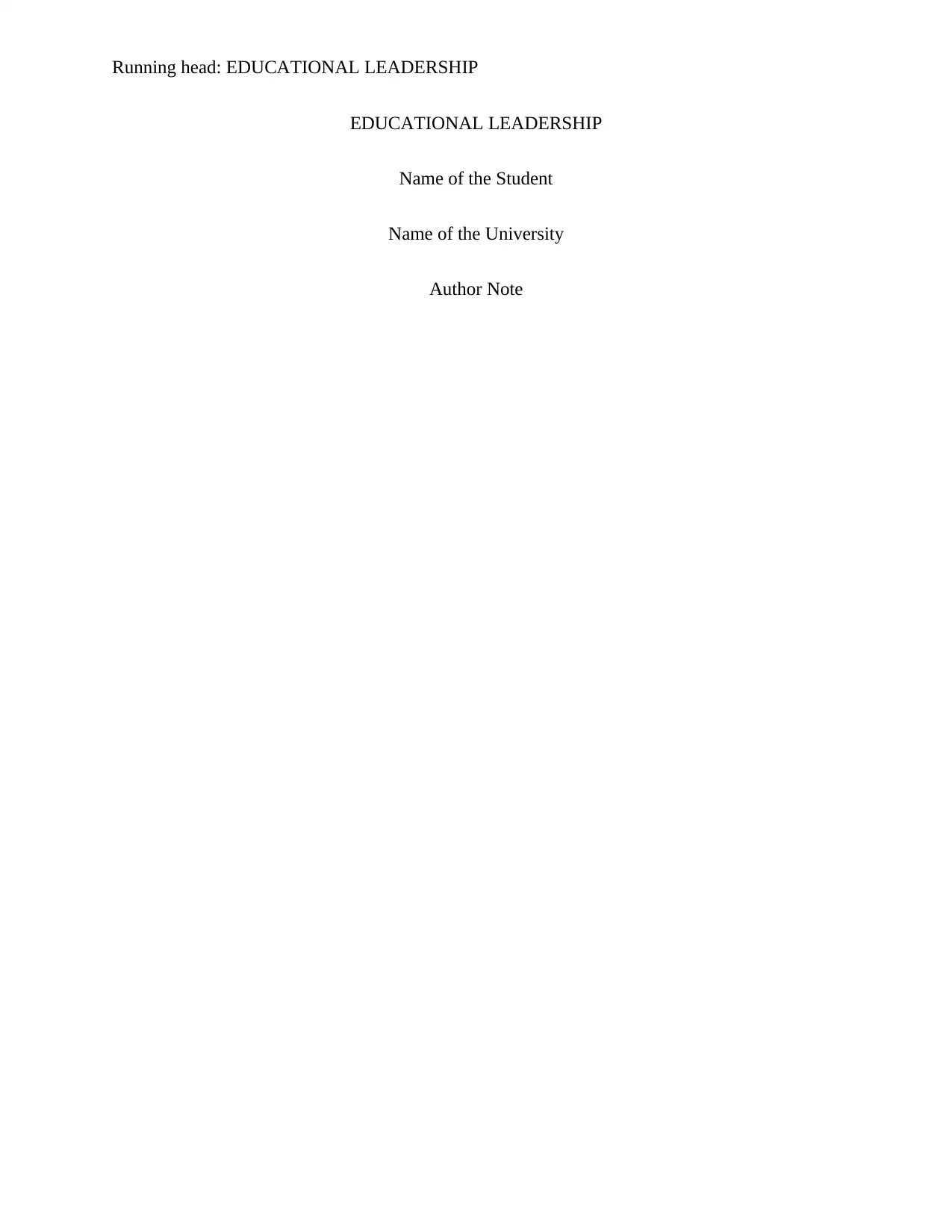
Running head: EDUCATIONAL LEADERSHIP
EDUCATIONAL LEADERSHIP
Name of the Student
Name of the University
Author Note
EDUCATIONAL LEADERSHIP
Name of the Student
Name of the University
Author Note
Paraphrase This Document
Need a fresh take? Get an instant paraphrase of this document with our AI Paraphraser
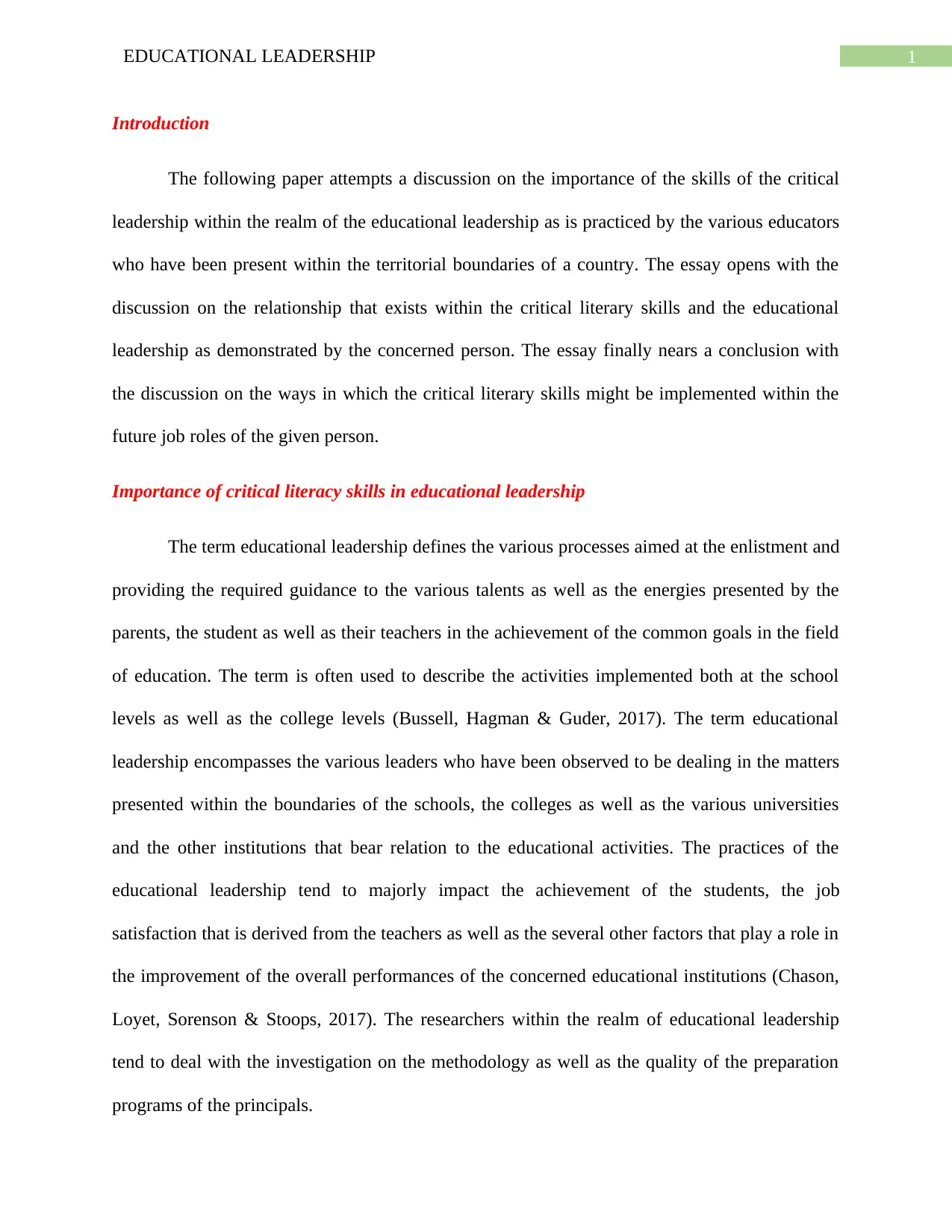
1EDUCATIONAL LEADERSHIP
Introduction
The following paper attempts a discussion on the importance of the skills of the critical
leadership within the realm of the educational leadership as is practiced by the various educators
who have been present within the territorial boundaries of a country. The essay opens with the
discussion on the relationship that exists within the critical literary skills and the educational
leadership as demonstrated by the concerned person. The essay finally nears a conclusion with
the discussion on the ways in which the critical literary skills might be implemented within the
future job roles of the given person.
Importance of critical literacy skills in educational leadership
The term educational leadership defines the various processes aimed at the enlistment and
providing the required guidance to the various talents as well as the energies presented by the
parents, the student as well as their teachers in the achievement of the common goals in the field
of education. The term is often used to describe the activities implemented both at the school
levels as well as the college levels (Bussell, Hagman & Guder, 2017). The term educational
leadership encompasses the various leaders who have been observed to be dealing in the matters
presented within the boundaries of the schools, the colleges as well as the various universities
and the other institutions that bear relation to the educational activities. The practices of the
educational leadership tend to majorly impact the achievement of the students, the job
satisfaction that is derived from the teachers as well as the several other factors that play a role in
the improvement of the overall performances of the concerned educational institutions (Chason,
Loyet, Sorenson & Stoops, 2017). The researchers within the realm of educational leadership
tend to deal with the investigation on the methodology as well as the quality of the preparation
programs of the principals.
Introduction
The following paper attempts a discussion on the importance of the skills of the critical
leadership within the realm of the educational leadership as is practiced by the various educators
who have been present within the territorial boundaries of a country. The essay opens with the
discussion on the relationship that exists within the critical literary skills and the educational
leadership as demonstrated by the concerned person. The essay finally nears a conclusion with
the discussion on the ways in which the critical literary skills might be implemented within the
future job roles of the given person.
Importance of critical literacy skills in educational leadership
The term educational leadership defines the various processes aimed at the enlistment and
providing the required guidance to the various talents as well as the energies presented by the
parents, the student as well as their teachers in the achievement of the common goals in the field
of education. The term is often used to describe the activities implemented both at the school
levels as well as the college levels (Bussell, Hagman & Guder, 2017). The term educational
leadership encompasses the various leaders who have been observed to be dealing in the matters
presented within the boundaries of the schools, the colleges as well as the various universities
and the other institutions that bear relation to the educational activities. The practices of the
educational leadership tend to majorly impact the achievement of the students, the job
satisfaction that is derived from the teachers as well as the several other factors that play a role in
the improvement of the overall performances of the concerned educational institutions (Chason,
Loyet, Sorenson & Stoops, 2017). The researchers within the realm of educational leadership
tend to deal with the investigation on the methodology as well as the quality of the preparation
programs of the principals.
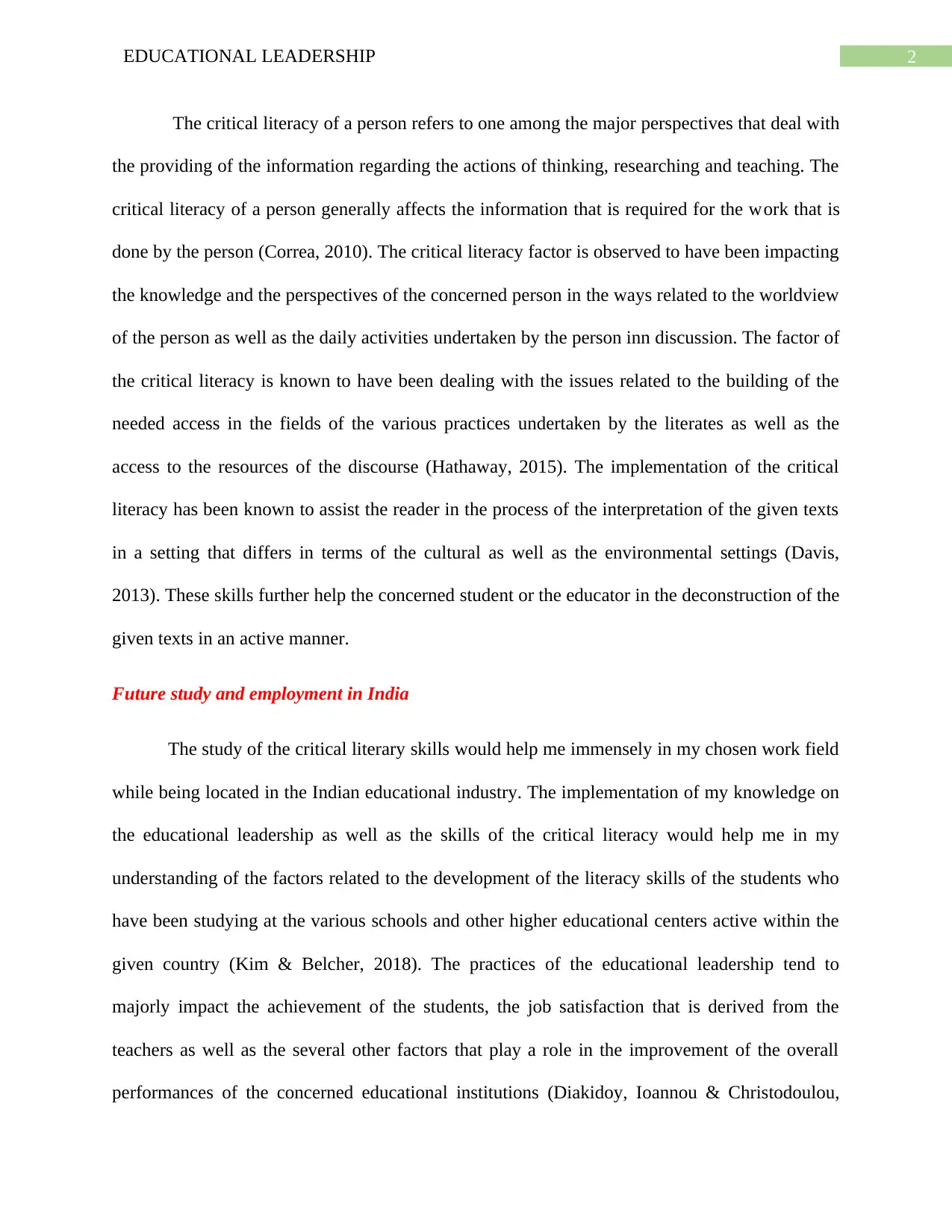
2EDUCATIONAL LEADERSHIP
The critical literacy of a person refers to one among the major perspectives that deal with
the providing of the information regarding the actions of thinking, researching and teaching. The
critical literacy of a person generally affects the information that is required for the work that is
done by the person (Correa, 2010). The critical literacy factor is observed to have been impacting
the knowledge and the perspectives of the concerned person in the ways related to the worldview
of the person as well as the daily activities undertaken by the person inn discussion. The factor of
the critical literacy is known to have been dealing with the issues related to the building of the
needed access in the fields of the various practices undertaken by the literates as well as the
access to the resources of the discourse (Hathaway, 2015). The implementation of the critical
literacy has been known to assist the reader in the process of the interpretation of the given texts
in a setting that differs in terms of the cultural as well as the environmental settings (Davis,
2013). These skills further help the concerned student or the educator in the deconstruction of the
given texts in an active manner.
Future study and employment in India
The study of the critical literary skills would help me immensely in my chosen work field
while being located in the Indian educational industry. The implementation of my knowledge on
the educational leadership as well as the skills of the critical literacy would help me in my
understanding of the factors related to the development of the literacy skills of the students who
have been studying at the various schools and other higher educational centers active within the
given country (Kim & Belcher, 2018). The practices of the educational leadership tend to
majorly impact the achievement of the students, the job satisfaction that is derived from the
teachers as well as the several other factors that play a role in the improvement of the overall
performances of the concerned educational institutions (Diakidoy, Ioannou & Christodoulou,
The critical literacy of a person refers to one among the major perspectives that deal with
the providing of the information regarding the actions of thinking, researching and teaching. The
critical literacy of a person generally affects the information that is required for the work that is
done by the person (Correa, 2010). The critical literacy factor is observed to have been impacting
the knowledge and the perspectives of the concerned person in the ways related to the worldview
of the person as well as the daily activities undertaken by the person inn discussion. The factor of
the critical literacy is known to have been dealing with the issues related to the building of the
needed access in the fields of the various practices undertaken by the literates as well as the
access to the resources of the discourse (Hathaway, 2015). The implementation of the critical
literacy has been known to assist the reader in the process of the interpretation of the given texts
in a setting that differs in terms of the cultural as well as the environmental settings (Davis,
2013). These skills further help the concerned student or the educator in the deconstruction of the
given texts in an active manner.
Future study and employment in India
The study of the critical literary skills would help me immensely in my chosen work field
while being located in the Indian educational industry. The implementation of my knowledge on
the educational leadership as well as the skills of the critical literacy would help me in my
understanding of the factors related to the development of the literacy skills of the students who
have been studying at the various schools and other higher educational centers active within the
given country (Kim & Belcher, 2018). The practices of the educational leadership tend to
majorly impact the achievement of the students, the job satisfaction that is derived from the
teachers as well as the several other factors that play a role in the improvement of the overall
performances of the concerned educational institutions (Diakidoy, Ioannou & Christodoulou,
⊘ This is a preview!⊘
Do you want full access?
Subscribe today to unlock all pages.

Trusted by 1+ million students worldwide
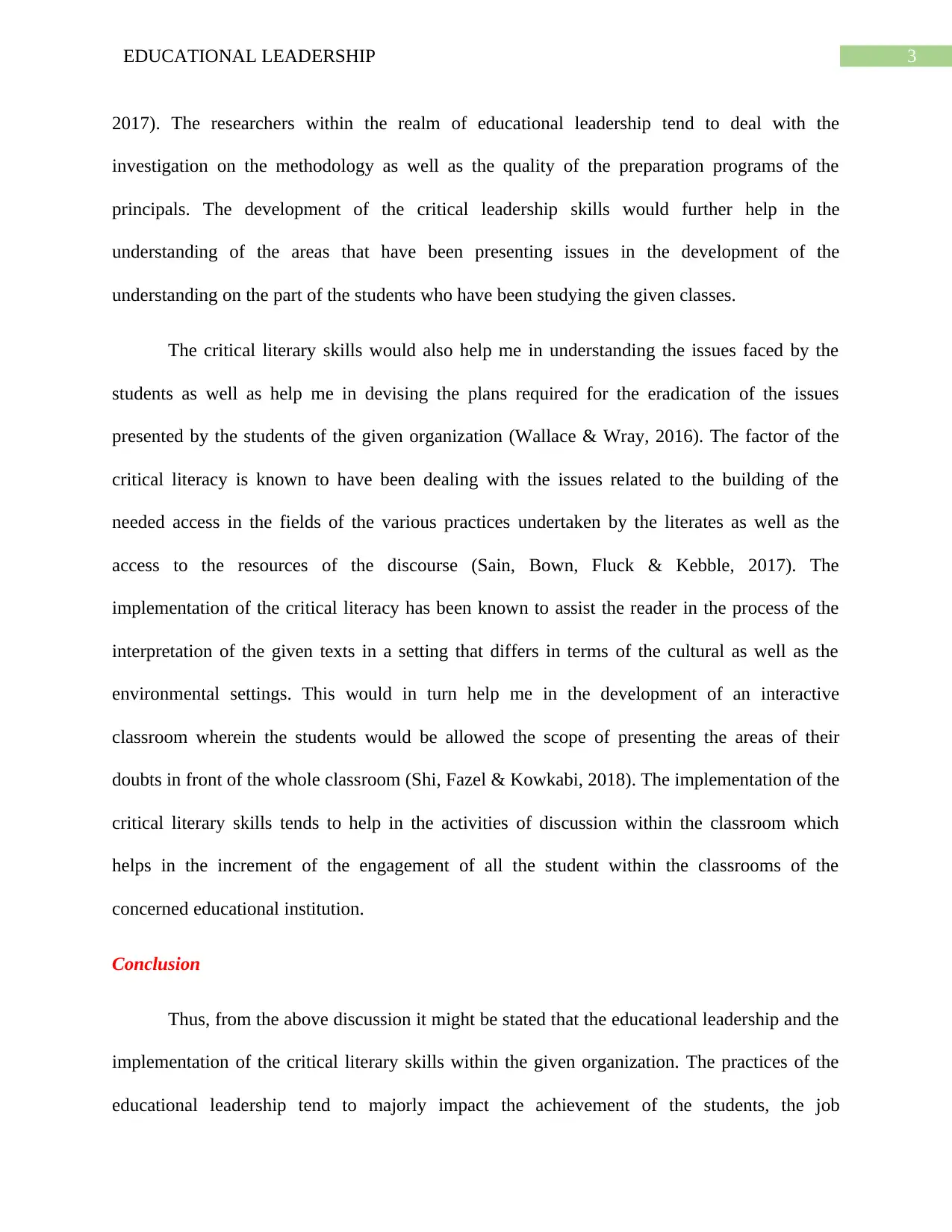
3EDUCATIONAL LEADERSHIP
2017). The researchers within the realm of educational leadership tend to deal with the
investigation on the methodology as well as the quality of the preparation programs of the
principals. The development of the critical leadership skills would further help in the
understanding of the areas that have been presenting issues in the development of the
understanding on the part of the students who have been studying the given classes.
The critical literary skills would also help me in understanding the issues faced by the
students as well as help me in devising the plans required for the eradication of the issues
presented by the students of the given organization (Wallace & Wray, 2016). The factor of the
critical literacy is known to have been dealing with the issues related to the building of the
needed access in the fields of the various practices undertaken by the literates as well as the
access to the resources of the discourse (Sain, Bown, Fluck & Kebble, 2017). The
implementation of the critical literacy has been known to assist the reader in the process of the
interpretation of the given texts in a setting that differs in terms of the cultural as well as the
environmental settings. This would in turn help me in the development of an interactive
classroom wherein the students would be allowed the scope of presenting the areas of their
doubts in front of the whole classroom (Shi, Fazel & Kowkabi, 2018). The implementation of the
critical literary skills tends to help in the activities of discussion within the classroom which
helps in the increment of the engagement of all the student within the classrooms of the
concerned educational institution.
Conclusion
Thus, from the above discussion it might be stated that the educational leadership and the
implementation of the critical literary skills within the given organization. The practices of the
educational leadership tend to majorly impact the achievement of the students, the job
2017). The researchers within the realm of educational leadership tend to deal with the
investigation on the methodology as well as the quality of the preparation programs of the
principals. The development of the critical leadership skills would further help in the
understanding of the areas that have been presenting issues in the development of the
understanding on the part of the students who have been studying the given classes.
The critical literary skills would also help me in understanding the issues faced by the
students as well as help me in devising the plans required for the eradication of the issues
presented by the students of the given organization (Wallace & Wray, 2016). The factor of the
critical literacy is known to have been dealing with the issues related to the building of the
needed access in the fields of the various practices undertaken by the literates as well as the
access to the resources of the discourse (Sain, Bown, Fluck & Kebble, 2017). The
implementation of the critical literacy has been known to assist the reader in the process of the
interpretation of the given texts in a setting that differs in terms of the cultural as well as the
environmental settings. This would in turn help me in the development of an interactive
classroom wherein the students would be allowed the scope of presenting the areas of their
doubts in front of the whole classroom (Shi, Fazel & Kowkabi, 2018). The implementation of the
critical literary skills tends to help in the activities of discussion within the classroom which
helps in the increment of the engagement of all the student within the classrooms of the
concerned educational institution.
Conclusion
Thus, from the above discussion it might be stated that the educational leadership and the
implementation of the critical literary skills within the given organization. The practices of the
educational leadership tend to majorly impact the achievement of the students, the job
Paraphrase This Document
Need a fresh take? Get an instant paraphrase of this document with our AI Paraphraser
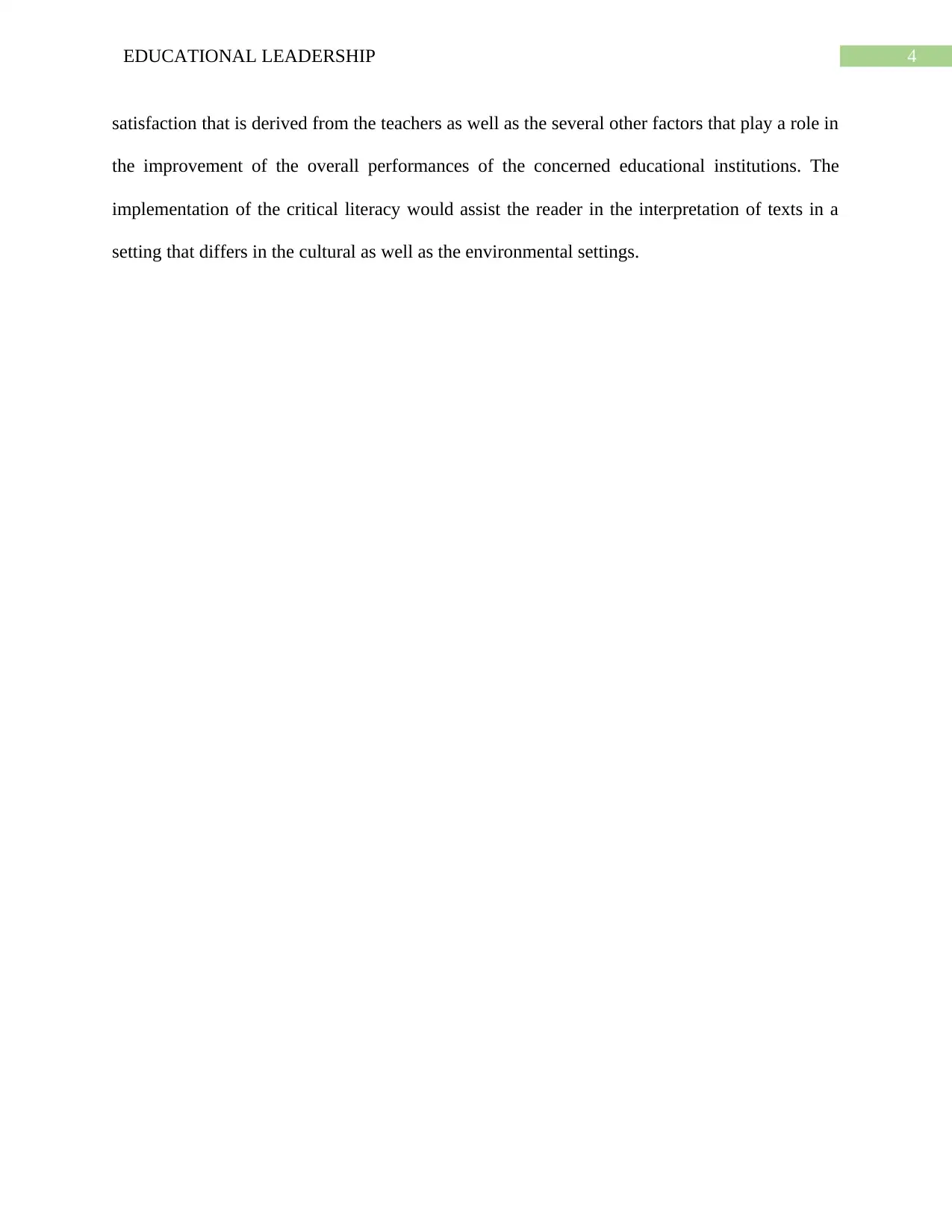
4EDUCATIONAL LEADERSHIP
satisfaction that is derived from the teachers as well as the several other factors that play a role in
the improvement of the overall performances of the concerned educational institutions. The
implementation of the critical literacy would assist the reader in the interpretation of texts in a
setting that differs in the cultural as well as the environmental settings.
satisfaction that is derived from the teachers as well as the several other factors that play a role in
the improvement of the overall performances of the concerned educational institutions. The
implementation of the critical literacy would assist the reader in the interpretation of texts in a
setting that differs in the cultural as well as the environmental settings.
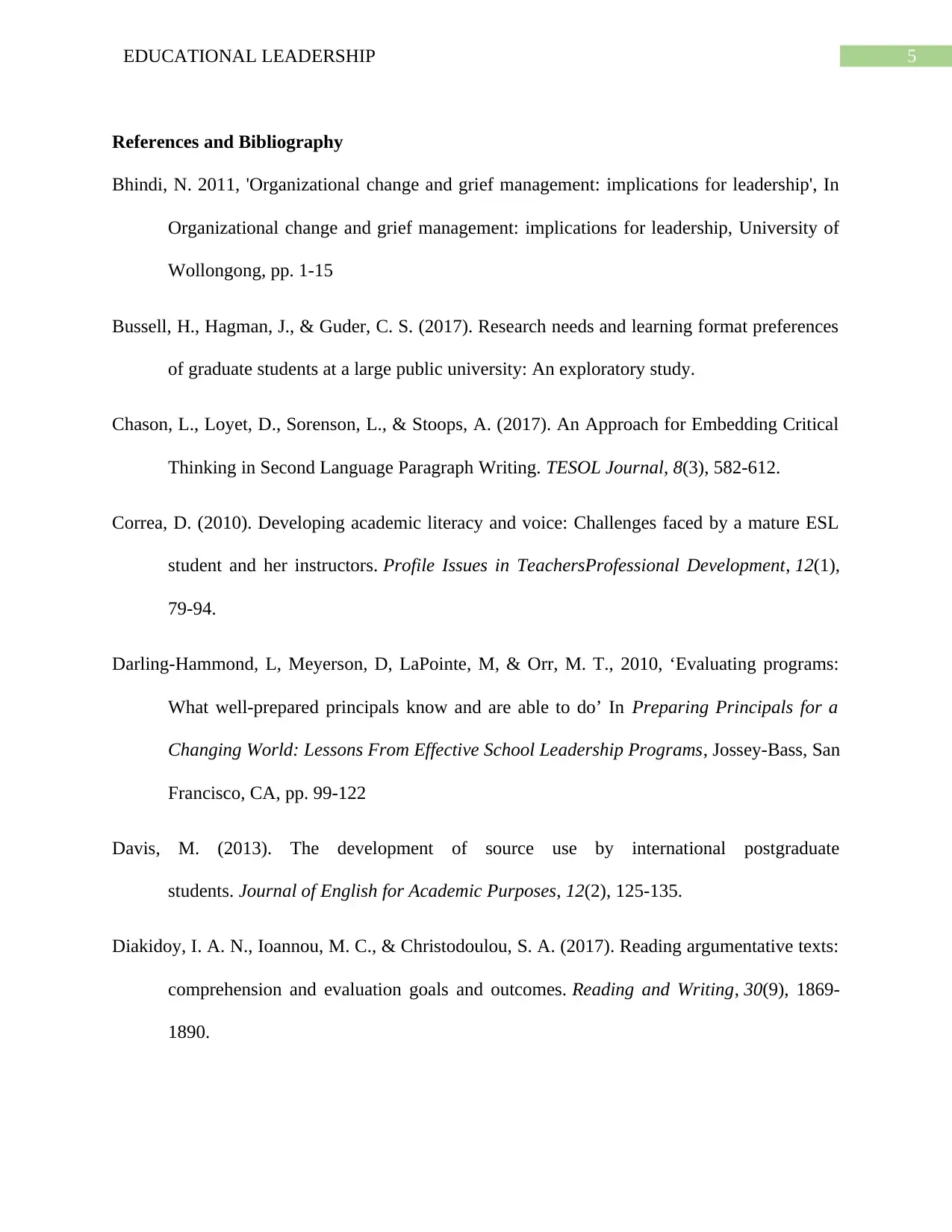
5EDUCATIONAL LEADERSHIP
References and Bibliography
Bhindi, N. 2011, 'Organizational change and grief management: implications for leadership', In
Organizational change and grief management: implications for leadership, University of
Wollongong, pp. 1-15
Bussell, H., Hagman, J., & Guder, C. S. (2017). Research needs and learning format preferences
of graduate students at a large public university: An exploratory study.
Chason, L., Loyet, D., Sorenson, L., & Stoops, A. (2017). An Approach for Embedding Critical
Thinking in Second Language Paragraph Writing. TESOL Journal, 8(3), 582-612.
Correa, D. (2010). Developing academic literacy and voice: Challenges faced by a mature ESL
student and her instructors. Profile Issues in TeachersProfessional Development, 12(1),
79-94.
Darling-Hammond, L, Meyerson, D, LaPointe, M, & Orr, M. T., 2010, ‘Evaluating programs:
What well-prepared principals know and are able to do’ In Preparing Principals for a
Changing World: Lessons From Effective School Leadership Programs, Jossey-Bass, San
Francisco, CA, pp. 99-122
Davis, M. (2013). The development of source use by international postgraduate
students. Journal of English for Academic Purposes, 12(2), 125-135.
Diakidoy, I. A. N., Ioannou, M. C., & Christodoulou, S. A. (2017). Reading argumentative texts:
comprehension and evaluation goals and outcomes. Reading and Writing, 30(9), 1869-
1890.
References and Bibliography
Bhindi, N. 2011, 'Organizational change and grief management: implications for leadership', In
Organizational change and grief management: implications for leadership, University of
Wollongong, pp. 1-15
Bussell, H., Hagman, J., & Guder, C. S. (2017). Research needs and learning format preferences
of graduate students at a large public university: An exploratory study.
Chason, L., Loyet, D., Sorenson, L., & Stoops, A. (2017). An Approach for Embedding Critical
Thinking in Second Language Paragraph Writing. TESOL Journal, 8(3), 582-612.
Correa, D. (2010). Developing academic literacy and voice: Challenges faced by a mature ESL
student and her instructors. Profile Issues in TeachersProfessional Development, 12(1),
79-94.
Darling-Hammond, L, Meyerson, D, LaPointe, M, & Orr, M. T., 2010, ‘Evaluating programs:
What well-prepared principals know and are able to do’ In Preparing Principals for a
Changing World: Lessons From Effective School Leadership Programs, Jossey-Bass, San
Francisco, CA, pp. 99-122
Davis, M. (2013). The development of source use by international postgraduate
students. Journal of English for Academic Purposes, 12(2), 125-135.
Diakidoy, I. A. N., Ioannou, M. C., & Christodoulou, S. A. (2017). Reading argumentative texts:
comprehension and evaluation goals and outcomes. Reading and Writing, 30(9), 1869-
1890.
⊘ This is a preview!⊘
Do you want full access?
Subscribe today to unlock all pages.

Trusted by 1+ million students worldwide
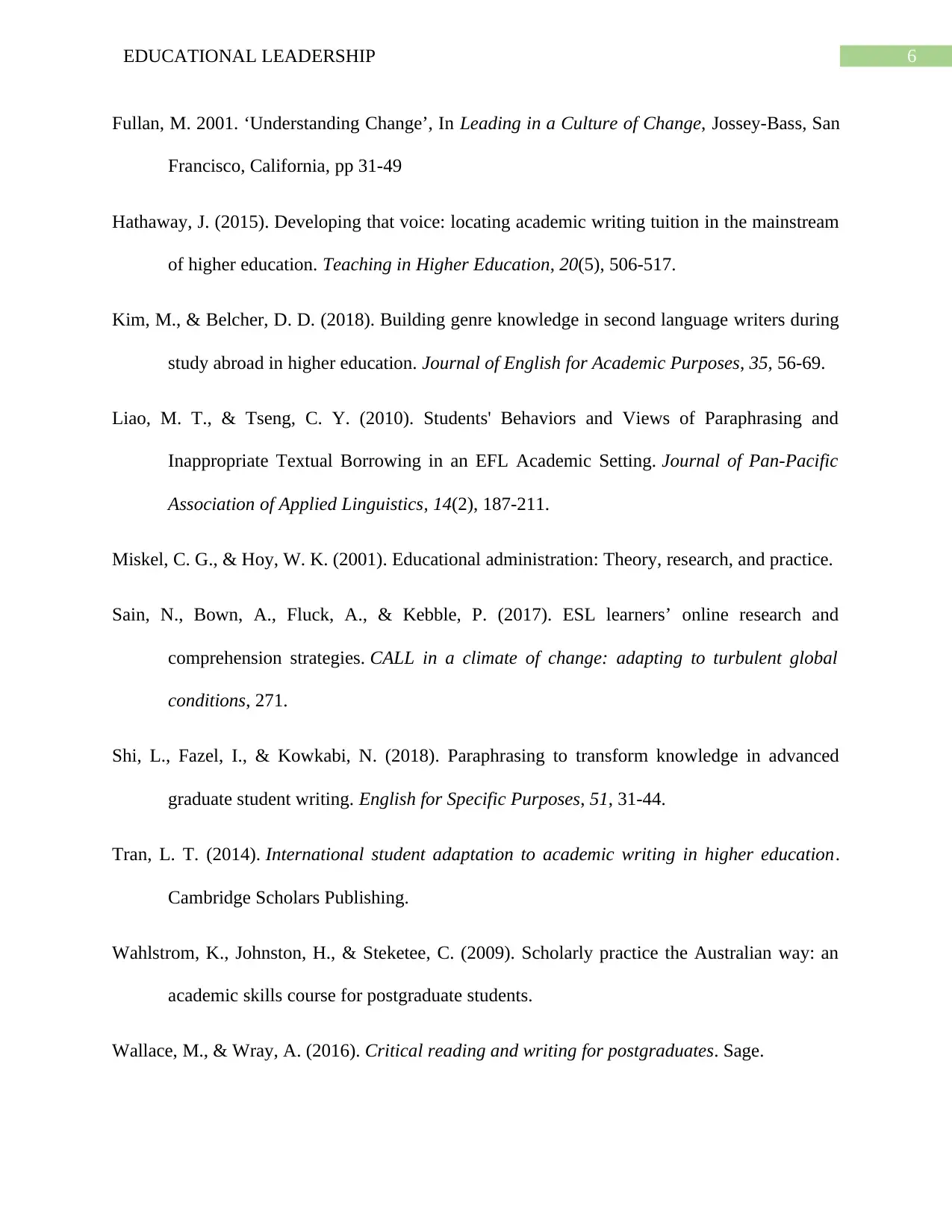
6EDUCATIONAL LEADERSHIP
Fullan, M. 2001. ‘Understanding Change’, In Leading in a Culture of Change, Jossey-Bass, San
Francisco, California, pp 31-49
Hathaway, J. (2015). Developing that voice: locating academic writing tuition in the mainstream
of higher education. Teaching in Higher Education, 20(5), 506-517.
Kim, M., & Belcher, D. D. (2018). Building genre knowledge in second language writers during
study abroad in higher education. Journal of English for Academic Purposes, 35, 56-69.
Liao, M. T., & Tseng, C. Y. (2010). Students' Behaviors and Views of Paraphrasing and
Inappropriate Textual Borrowing in an EFL Academic Setting. Journal of Pan-Pacific
Association of Applied Linguistics, 14(2), 187-211.
Miskel, C. G., & Hoy, W. K. (2001). Educational administration: Theory, research, and practice.
Sain, N., Bown, A., Fluck, A., & Kebble, P. (2017). ESL learners’ online research and
comprehension strategies. CALL in a climate of change: adapting to turbulent global
conditions, 271.
Shi, L., Fazel, I., & Kowkabi, N. (2018). Paraphrasing to transform knowledge in advanced
graduate student writing. English for Specific Purposes, 51, 31-44.
Tran, L. T. (2014). International student adaptation to academic writing in higher education.
Cambridge Scholars Publishing.
Wahlstrom, K., Johnston, H., & Steketee, C. (2009). Scholarly practice the Australian way: an
academic skills course for postgraduate students.
Wallace, M., & Wray, A. (2016). Critical reading and writing for postgraduates. Sage.
Fullan, M. 2001. ‘Understanding Change’, In Leading in a Culture of Change, Jossey-Bass, San
Francisco, California, pp 31-49
Hathaway, J. (2015). Developing that voice: locating academic writing tuition in the mainstream
of higher education. Teaching in Higher Education, 20(5), 506-517.
Kim, M., & Belcher, D. D. (2018). Building genre knowledge in second language writers during
study abroad in higher education. Journal of English for Academic Purposes, 35, 56-69.
Liao, M. T., & Tseng, C. Y. (2010). Students' Behaviors and Views of Paraphrasing and
Inappropriate Textual Borrowing in an EFL Academic Setting. Journal of Pan-Pacific
Association of Applied Linguistics, 14(2), 187-211.
Miskel, C. G., & Hoy, W. K. (2001). Educational administration: Theory, research, and practice.
Sain, N., Bown, A., Fluck, A., & Kebble, P. (2017). ESL learners’ online research and
comprehension strategies. CALL in a climate of change: adapting to turbulent global
conditions, 271.
Shi, L., Fazel, I., & Kowkabi, N. (2018). Paraphrasing to transform knowledge in advanced
graduate student writing. English for Specific Purposes, 51, 31-44.
Tran, L. T. (2014). International student adaptation to academic writing in higher education.
Cambridge Scholars Publishing.
Wahlstrom, K., Johnston, H., & Steketee, C. (2009). Scholarly practice the Australian way: an
academic skills course for postgraduate students.
Wallace, M., & Wray, A. (2016). Critical reading and writing for postgraduates. Sage.
1 out of 7
Related Documents
Your All-in-One AI-Powered Toolkit for Academic Success.
+13062052269
info@desklib.com
Available 24*7 on WhatsApp / Email
![[object Object]](/_next/static/media/star-bottom.7253800d.svg)
Unlock your academic potential
Copyright © 2020–2026 A2Z Services. All Rights Reserved. Developed and managed by ZUCOL.





